The Business of Maritime Affairs and Fisheries Minister’s Son
Monday, October 14, 2024
Minister Sakti Wahyu Trenggono revives a shutdown port. There is indication that the minister’s son is involved in the fisheries business.
arsip tempo : 1745676748100.
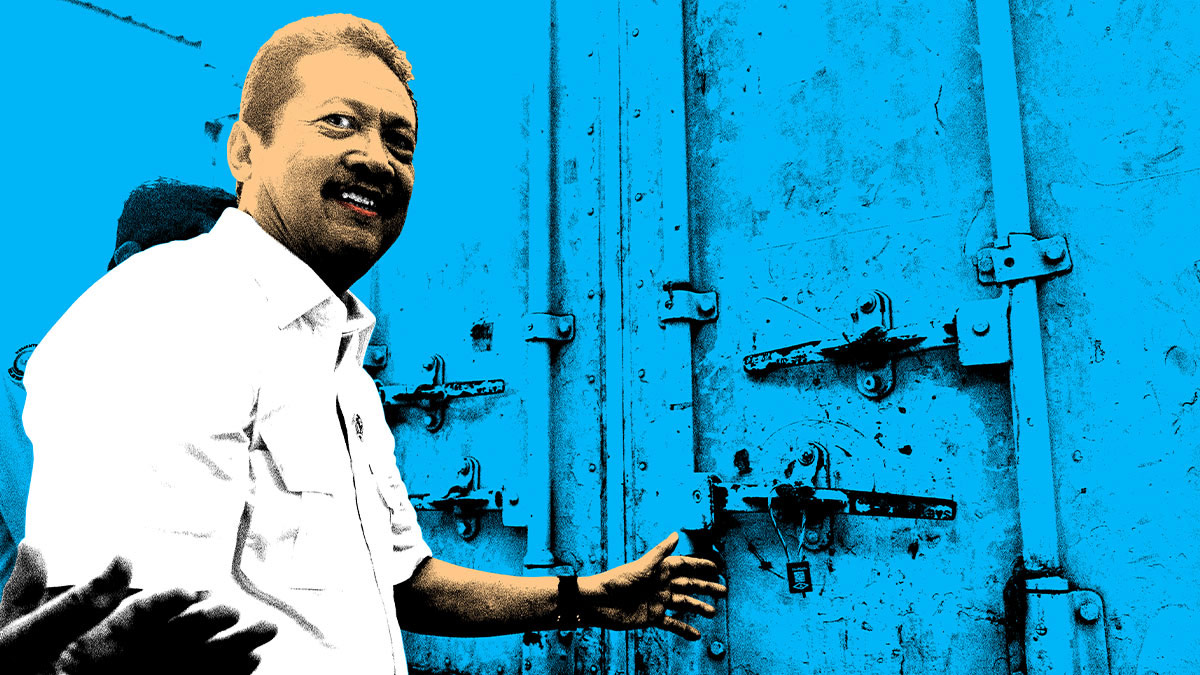
THE Benjina Fishing Port in the Aru Islands Regency, Maluku, seemed like a ghost town on Saturday, June 8, 2024. Despite it being only midday, the once bustling facility owned by Industri Perikanan Arafura was eerily quiet. A decade ago, Benjina Port was the heart of Aru Islands’ flourishing economy.
That day, several men were dismantling an Antasena boat to collect scrap metal. The port’s warehouse appeared abandoned and the backyard cooler’s iron was riddled with rust. “We are completing repair work, specifically adding cold storage,” said Agus Kurniawan, Chief Executive Officer (CEO) of Industri Perikanan Arafura (IPA), in a written interview on Friday, September 20.
In 2015, Minister of Maritime Affairs and Fisheries Susi Pudjiastuti revoked Benjina Port’s management permit, held by Pusaka Benjina Resources, after the ministry found practices of vessel crew slavery and illegal fishing. Pusaka Benjina then became IPA. According to IPA’s company deed, Pusaka Benjina changed the company name to IPA on March 3, 2020.
Agus said the government’s permit revocation caused damage to the company’s facilities, including its boats. The company has attempted to repair the damages, but the engine and cooling system are still not functioning. “We need to have a more comprehensive evaluation to address these issues,” he said.
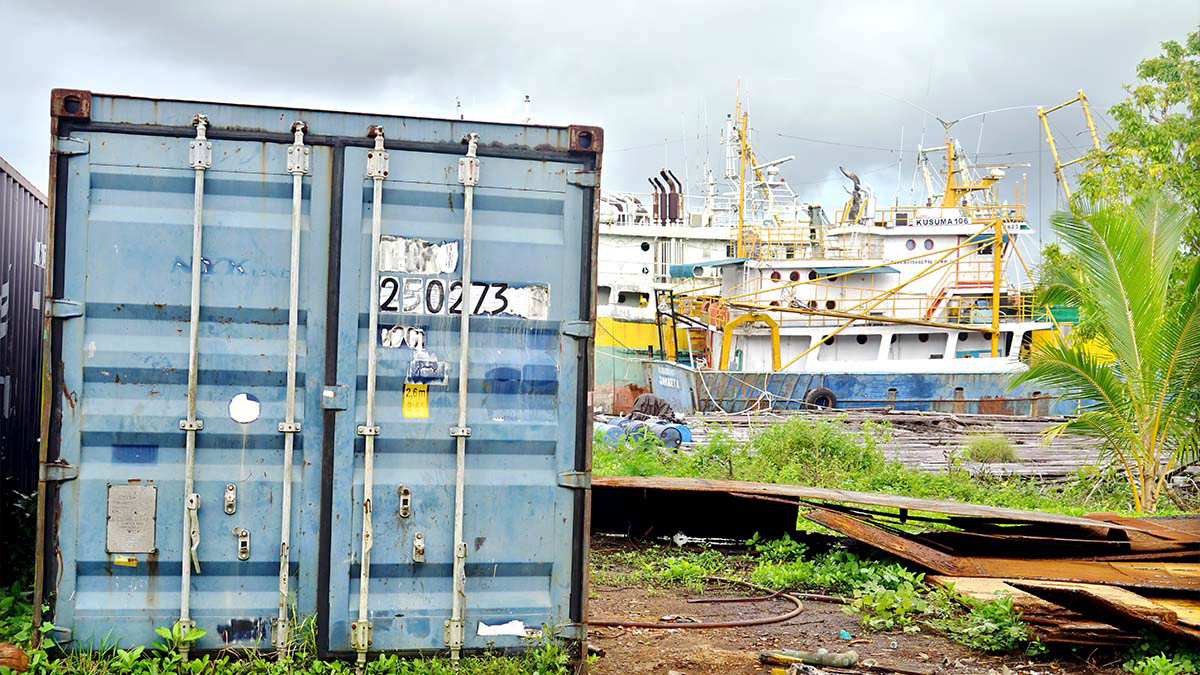
A fish container owned by Industri Perikanan Arafura, formerly known as Pusaka Benjina Resources, at the Benjina Port dock, Aru Islands, Maluku, June 8, 2024. TEMPO/Jaring.id
Benjina Port’s quiet atmosphere has not prevented it from receiving a special government assignment. Current Minister of Maritime Affairs and Fisheries, Sakti Wahyu Trenggono, issued Decree No. 43/2022 on Benjina Port’s Status as a Fishing Port Not Developed by the Government. Wahyu Trenggono asked IPA to form the port’s management and communicate port activities with the Maritime Affairs Minister and Maluku Governor.
Benjina’s appointment as a fishing port came after the company’s lobbying. According to Agus, IPA had already made a request on September 9, 2020, or two years before Wahyu Trenggono issued the decree. “It was a long process,” he explained.
The Maritime Affairs Minister’s assignment has not made Benjina Port busy. IPA CEO Agus Kurniawan says the company’s boats still have technical problems. Furthermore, the company is still engaged with a fishing community from Pati, Central Java, to discuss the port’s operations. “We are discussing partnership with the Samudera Mitra Nelayan Cooperative (a fishing cooperative),” said Agus.
Despite the challenges, Benjina attempted to put on a good show before Minister Wahyu Trenggono visited the port on Monday, June 3, 2024. It was there that the former Deputy Minister of Defense launched his flagship program: Measured Fishing (PIT), a program to protect maritime biodiversity by regulating zones and fishing quotas.
Dozens of workers bustled around the cold storage, while some fiddled with boats' engines and others polished the walls of the office. “We only started repair work before the minister came,” said Benjina Port employee, Zuhri Sugiat, when we met him at the site.
Three sources in the fisheries sector, two of whom are businesspeople, said the Ministry chose Benjina Port due to its strategic location. The port already has a marina and is close to a river. The river makes fisheries businesses feel more secure to dock their vessels.
Another reason is its economic potential. The same sources said they are required to land all their catches at Benjina Port. According to a Maritime Affairs and Fisheries Ministry document, Benjina is projected to become one of the export ports within Fishery Management Area 718, which includes the Aru Sea, the Arafura Sea, and the eastern part of the Timor Sea. The Ministry estimates that the fishery industry in this region could be worth over Rp6.9 trillion (around US$442.3 million).
This economic potential made Benjina an attractive option for businesspeople. A fishery businessperson recalled attending a meeting organized by a Maritime Affairs Ministry official at a hotel in Central Jakarta. The gathering was attended by several businesspeople.The businessman present at the meeting disclosed that the Ministry official requested businesspeople to have their boats dock at Benjina Port. However, the port’s management would be led by Indra Nugroho Trenggono, the son of Minister Wahyu Trenggono. Tempo and Jaring attempted to get Indra’s response by visiting his home in Bekasi, West Java, on Wednesday, September 25, as listed in the company documents of several fishery businesses. His large house was guarded by soldiers in green camouflage uniform. The Navy officers mentioned that Indra was not home.
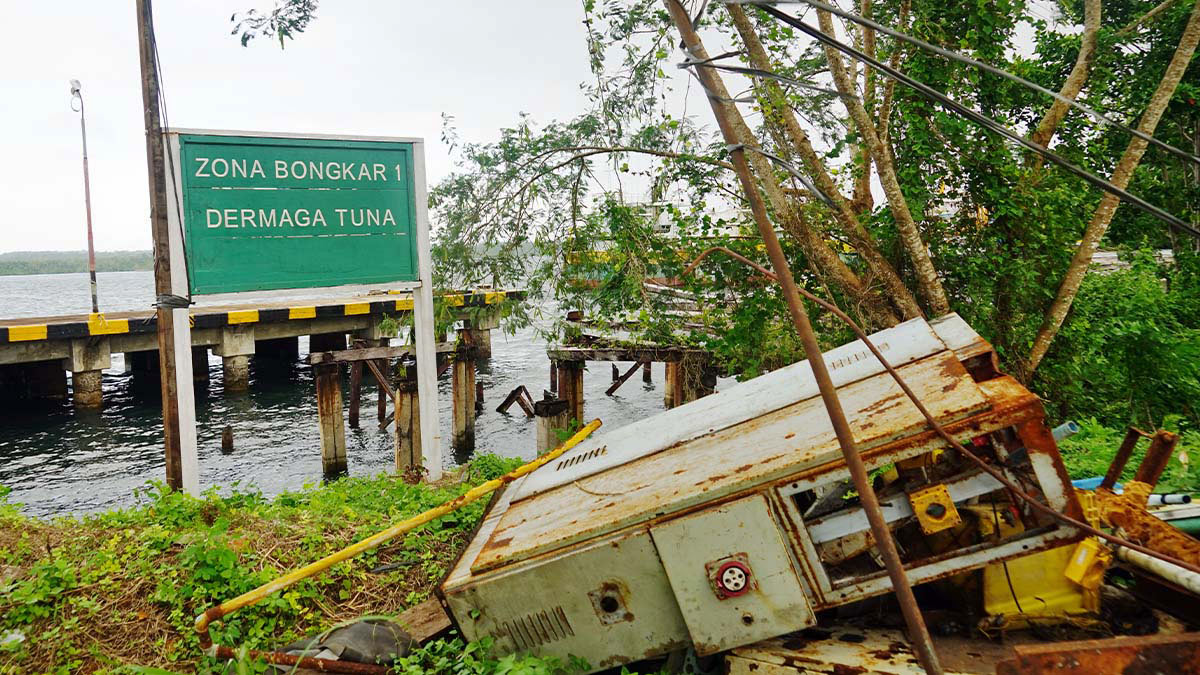
Tuna unloading zone at the Benjina Fishery Port, Aru Islands, Maluku, June 2024. TEMPO/Jaring.id
Interview requests were also sent to Wahyu Trenggono, Indra’s father. When asked about Indra’s business plans at Benjina after attending a luncheon featuring Jade Perch fish in Gambir, Central Jakarta, Wahyu Trenggono directed Tempo to ask the Minister’s Special Staff, Wahyu Muryadi. He then entered his vehicle, ignoring further questions.
Wahyu Muryadi clarified that Indra had no intention of managing Benjina Port. He claimed to have asked about Indra’s plan to his boss, Minister Wahyu Trenggono, who replied by asking who was interested in managing Benjina. “His business is with betta fish. (It’s) small, and not highly profitable,” he said.
Meanwhile, IPA CEO Agus Kurniawan said the company had no communications with anyone regarding Benjina’s management, except for discussions with the Mitra Nelayan Samudera Cooperative from Pati. “We are only engaged in in-depth discussions with people from Pati,” Agus emphasized.
•••
MINISTER of Maritime Affairs and Fisheries Sakti Wahyu Trenggono did more than issue a Minister’s decree for Benjina Port. He also signed the Maritime Affairs and Fisheries Minister Decree No. 40/2022 on Tual Port’s Status as a Fishing Port Not Developed by the Government.
Before it was assigned as a fishing port, Tual Port was previously prepared for oil and gas exploration. In November 2019, Tempo reported that the port owned by the Artha Graha Group—an enterprise founded by businessman Tomy Winata—was earmarked as the future logistics hub for the Masela Block megaproject.
Minister Wahyu Trenggono visited Tual Port, owned by Samudera Indo Sejahtera, to conduct a simulation of the Measured Fishing program on Sunday, June 2. About 30 minutes before Wahyu Trenggono launched the program, crew members were seen unloading their catch from the IGP 18 motorboat. IGP stands for Insani Gemilang Pualam. The crew were transferring snapper, grouper, and hairtail fish from the boat’s hold.
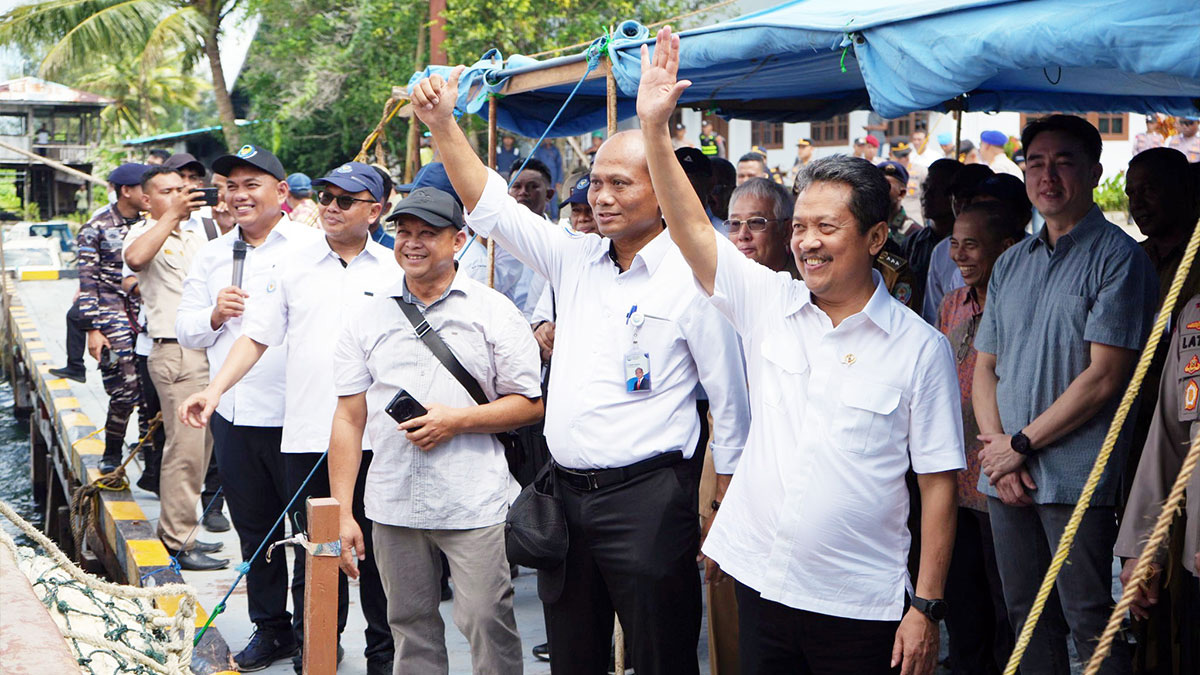
Maritine Affairs and Fisheries Minister Sakti Wahyu Trenggono inspecting the Benjina Fishery Port in the Aru Islands, Maluku, June 2024. Directorate-General of Capture Fisheries Doc.
That day, vessels with the codes TMP 51, 52, and 53 were also docked. The TMP name refers to the owner, Trinadi Mina Perkasa. Information about the vessels’ ownership is available on the Ministry of Transportation’s Shipping and Maritime Affairs Directorate’s website.
Arif Wijaya, Operations Director of Samudera Indo Sejahtera, claimed that the presence of TMP-coded boats in their area complied with regulations. Samudera, he said, aimed to provide facilities for vessels adhering to the rules. “We do not have any special partnership with Trinadi,” Arif stated.
The TMP 51, 52, and 53 boats were previously known as the Wogekel 21, 23, and 17. These vessels were initially owned by Dwikarya Reksa Abadi, a company that had its fishing business and fishing permits revoked during Susi Pudjiastuti’s tenure as Maritime Affairs and Fisheries Minister.
The analysis and evaluation documents of Dwikarya’s fleet showed that 61 vessels were purchased from China. However, there was no supporting data or shipbuilding contracts. Moreover, these vessels were registered in both Indonesia and China.
The analysis also highlighted a number of violations, including paying wages below the standard, bribing law enforcement officials, and using trawl nets that damaged ecosystems. Dwikarya’s vessels were also found guilty of transferring cargo mid-sea and smuggling protected wildlife from Maluku and Papua.
During the fishing moratorium imposed by Minister Susi’s administration, 1,132 foreign-made vessels were banned from operating. This number was based on the Ministry of Maritime Affairs and Fisheries analysis and evaluation, as outlined in letter B-755/SJ/VI/2016, dated June 16, 2016. The letter was signed by the Ministry’s Secretary-General at the time, Sjarief Widjaja.
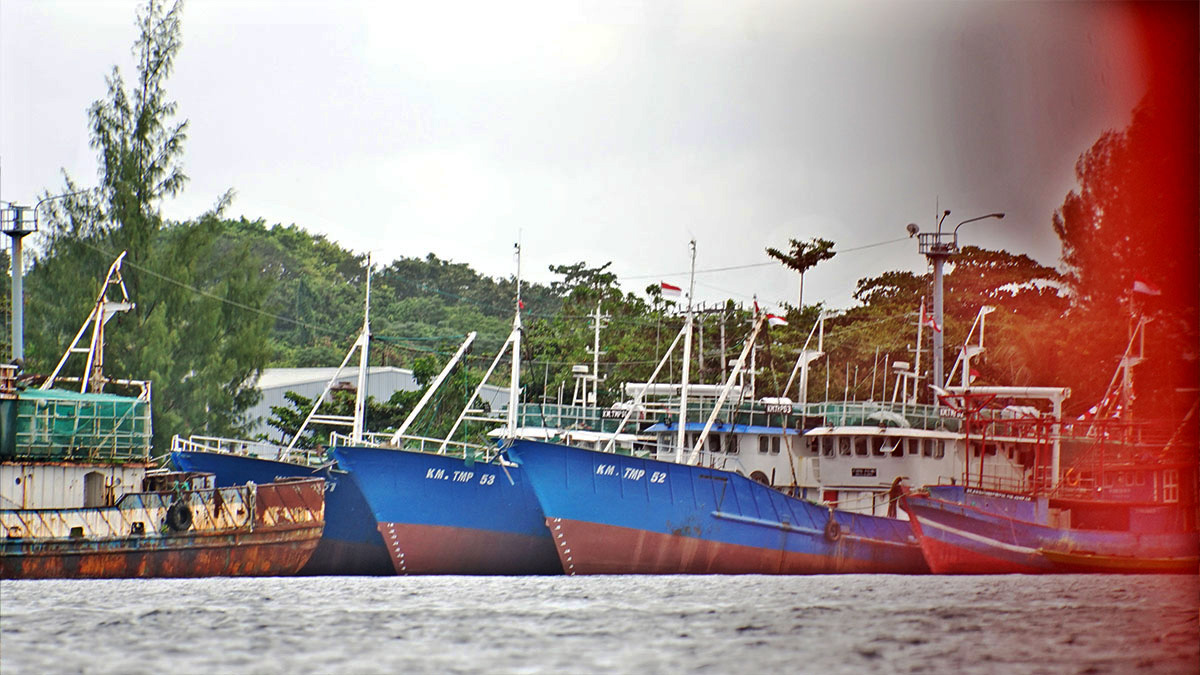
The TMP 51, TMP 52, and TMP 53 vessels owned by Trinadi Mina Perkasa docked at the Tual Fishery Port belonging to Samudera Indo Sejahtera, Maluku, June 3, 2024. TEMPO/Jaring.id
After the moratorium, many of the foreign-made vessels returned to their countries of origin, including China, Thailand, Taiwan, Malaysia, and Cambodia. However, an estimated 300 vessels remained in Indonesia. One of these was the Wogekel.
The Wogekel boats were suspected of being re-registered with the Transportation Ministry and the Maritime Affairs Ministry under new names with TMP codes, and their fishing gear was modified. Additionally, ownership of the vessels was transferred from Dwikarya to Trinadi Mina Perkasa. This reveals once again the involvement of Indra Nugroho Trenggono, the son of Minister Sakti Wahyu Trenggono, in the fishery business.
In the company deed of Trinadi, there are several shareholders, both corporations and individuals. One of them is Indo Mina Lestari, which contributed capital worth Rp250 million (US$16,000), equivalent to 250 shares. Indo Mina Lestari’s presence as a shareholder in Trinadi was recorded in a deed dated October 2022.
Further investigation into the profile of Indo Mina Lestari reveals that company documents show Indra Nugroho Trenggono holding 750 shares, valued at Rp750 million (US$48,000). This ownership was documented in papers dated May 6, 2024.
Another shareholder in Trinadi and Indo Mina Lestari—two companies connected to the vessels with codes TMP 51, 52, and 53—was traced to the name Rino Febrian. According to the deed, Rino serves as a director in Trinadi without owning any shares. Meanwhile, in Indo Mina, he is listed as a corporate director with 500 shares, worth Rp500 million (US$32,000).
Rino is none other than the son-in-law of State Secretary Minister Pratikno. The 31-year-old man always uses the address Jalan Widya Chandra I No. 4, Jakarta. This street is a residential complex for ministers managed by the Ministry of State Secretariat.
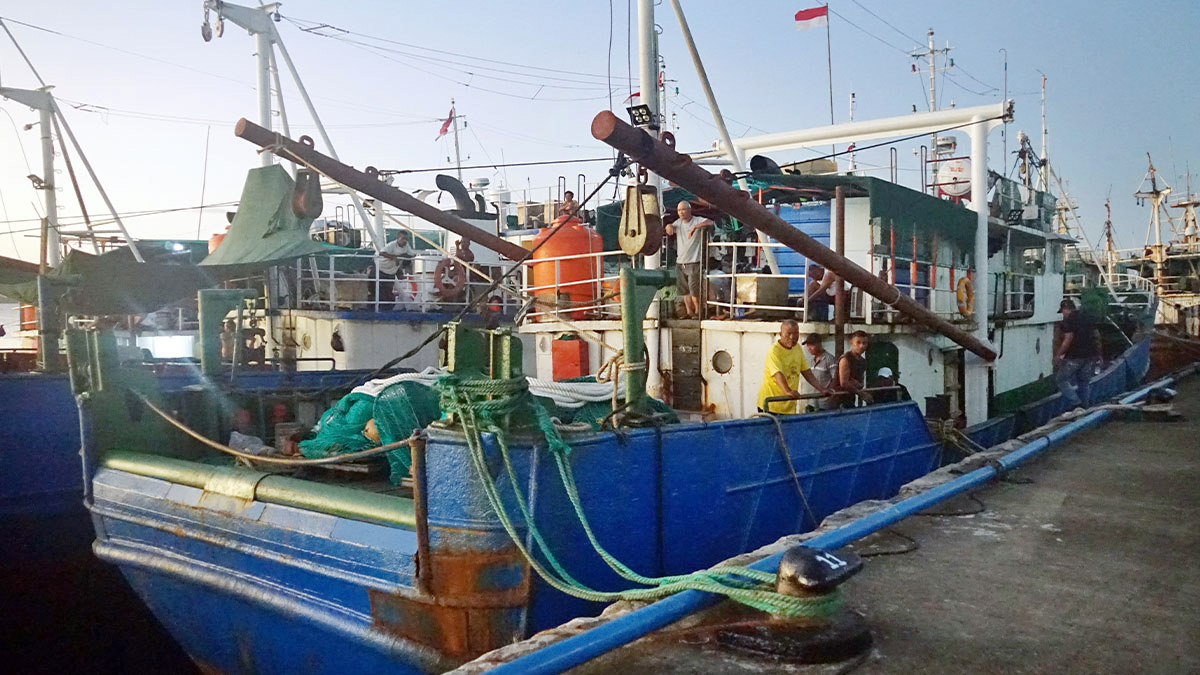
A TMP vessel with a Pocket Shrimp Trawl fishing gear docked at Tual Port, owned by Samudera Indo Sejahtera, Maluku, June 3, 2024. TEMPO/Jaring.id
The security guard on duty confirmed that the residence belongs to the State Secretary Minister and Rino’s father-in-law, Pratikno. The guard accepted the letter requesting an interview. “Rino is currently abroad,” said the guard at the security post.
An interview request was also delivered to the office of Indo Mina Lestari in the Blok M area, South Jakarta. The receptionist stated that Rino rarely comes to the office. Efforts to confirm this with Rino were also made by visiting the office of Global Seafood Indonesia on Jalan T.B. Simatupang, South Jakarta, on Wednesday, October 9. At this fishery company, Rino holds 150 shares worth Rp150 million (US$9,600). However, the office of Global on the 6th floor of Plaza 3 Pondok Indah was empty.
Rino’s father-in-law, State Secretary Minister Pratikno, said his son-in-law conducts business in accordance with regulations. The former Rector of Gadjah Mada University, Yogyakarta, recounted that Rino once asked for his opinion when he was about to enter the fishery sector. “I told him that the fishery business is a promising sector that has not been fully exploited,” Pratikno said in a written response.
Pratikno had no issue with his son-in-law’s business partnership with the son of the Fisheries Minister. “Collaboration is part of any profession,” he said. “What’s important is professionalism.”
•••
THE plan to revive Benjina Port in the Aru Islands Regency, Maluku, seems to have caught the attention of officials in Jakarta, including senior figures from the Vice President’s office. A fishery businessman shared that he had been invited to and attended a meeting on Tuesday, August 6, where officials from the Vice President’s office were present. One of the attendees was Masduki Baidlowi, the Vice President’s Special Staff for Communication and Information.
This source said the meeting discussed the opportunity for potential investors to enter Benjina Port, aiming to make port management more efficient. The discussion at the Vice President’s office also touched on efforts to improve fuel efficiency.
According to this businessman, fuel management could become cheaper if fishermen formed a community or cooperative. Additionally, the incomplete infrastructure at Benjina Port was another factor that potential investors considered before committing to the port.
On Monday, October 7, Masduki Baidlowi explained several points when asked to respond via telephone, but he asked not to be quoted.











